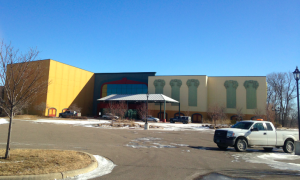There are still a number of things up in the air regarding one of St. Michael’s landmarks – the former Cinemagic Theater at the intersection of Highway 241 and Interstate 94.
North Wright County Today attempts to clear the air with this quick “Q&A.”
So, Riverside Church has sued the city. Why did they do that?
Riverside Church – which wants to use the theater as a “satellite campus” to simulcast church services – is suing because of the city’s decision to reject a zoning ordinance amendment that requested St. Michael allow churches in this particular commercially zoned area. The request was officially made by the church in May/June 2014, and the process started with the St. Michael Planning Commission a couple of months later. The planning commission voted, unanimously, not to change the ordinance the states churches must be built in residential areas, and the St. Michael City Council upheld that recommendation after its own series of negotiations with the church failed.
Why doesn’t the city council or planning commission want a church in the former theater? After all, it’s been empty for years.
Well, it boils down to two main reasons. One, St. Michael has a limited amount of land it has zoned commercial, and this would be one of the larger pieces along Highway 241. The city needs tax revenue  from commercial properties to collect taxes – commercial land brings in much more revenue to a city than residential property. Increased tax revenue keeps local property taxes down for homeowners. Also, the city council and planning commission were told by city staff that traffic counts on Highway 241, particularly at the intersection with O’Day Avenue Northeast, were a major concern in a study performed by SRE, an engineering firm consulting with the city. The city asked Riverside for capacity limits and some assurances about any future expansion, and those requests were rejected when Riverside broke off negotiations with the city regarding the amendment last fall.
from commercial properties to collect taxes – commercial land brings in much more revenue to a city than residential property. Increased tax revenue keeps local property taxes down for homeowners. Also, the city council and planning commission were told by city staff that traffic counts on Highway 241, particularly at the intersection with O’Day Avenue Northeast, were a major concern in a study performed by SRE, an engineering firm consulting with the city. The city asked Riverside for capacity limits and some assurances about any future expansion, and those requests were rejected when Riverside broke off negotiations with the city regarding the amendment last fall.
What grounds does the church believe it has to sue the city over that decision?
Riverside is pointing to the Religious Land Use and Institutionalized Persons Act, which was put in place by Congress under the Clinton Administration. That law was targeted, mainly, to property owners who weren’t allowing certain religious groups to rent space within commercial buildings, such as strip malls and empty commercial buildings, such as former theaters. It’s main purpose was to head off religious discrimination.
Isn’t the theater re-opening soon as a theater? What’s up with the St. Michael Cinema?
With the news that the request for a zoning ordinance amendment request by Riverside had failed, the current owners decided early in 2015 to begin promoting the theater’s re-opening as a theater. Over the last several weeks, improvements have been made inside the building, including lighting, masonry and flooring.
The ownership said Friday, asking for privacy, that they would abide by the Minneapolis Federal Court decision if and when that happens. But, for now, the plan is to continue to make renovations and to open the theater some time in either May or June.
Is the theater still for sale?
Nope. According to Commercial Realty Solutions in Buffalo, the property – for the first time in more than five years – is not listed. That means either the current group (St. Michael Cinema) or Riverside will move forward as owners once the court decides.
So what if the court rules in Riverside’s favor?
The ownership group said it would honor the terms of a purchase agreement put in place, similar to the negotiated agreement it had with Riverside nearly a year ago, and the theater would be sold to the church for their use.
What will this lawsuit cost taxpayers?
Probably not much – that’s the short answer. The city is a member of the League of Minnesota Cities, a consortium that protects municipalities much for this very reason. Riverside isn’t suing for huge damages – that wouldn’t be decided in a Federal Court, anyway. Riverside’s main challenge is the RLUIPA law and its application to the city’s zoning laws.
What does the lawsuit say?
Well, you can read a PDF here, which is about 26 pages long. They were filed Monday, March 24 in Minneapolis. Gray, Plant and Mooty is representing the church. George Hoff of the League of Minnesota Cities is representing the City of St. Michael.
Here’s the document: